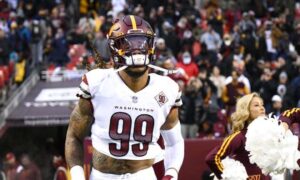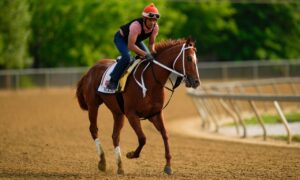
Virginia VGT machines have faced extensive scrutiny in the past year and it is likely that this will continue for the foreseeable future.
VA Sen. Joe Morrissey intends to address the matter as soon as he gets the chance.
Morrissey, along with three other Virginia legislators, embarked on a trip to Illinois to gain insights into the video gambling terminal industry. After their return, Morrissey is now determined to drive towards a resolution on a contentious matter that has been causing controversy for months.
Morrissey on board with Virginia VGT machines
Morrissey embarked on a journey organized by a lobbyist representing companies engaged in the operation and sale of terminals. The trip included three additional members of the state assembly.
- Sen. John Bell
- Sen. Jeremy McPike
- Del. Will Morefield
Morrissey had nothing but praise for the regulatory landscape he observed in his review.
Morrissey expressed his personal perspective on the matter, stating, “While I cannot speak for the other legislators, I personally found my visit to be purposeful and productive.” He further added, “I was highly impressed with the VGT industry, their professionalism, strong sense of responsibility, and dedication to prioritizing the public’s best interests.”
The quartet’s trip is intriguing due to its timing, coinciding with the recent implementation of a state ban on skill-based machines (“gray machines”) in VA. Starting July 1, convenience stores, grocers, and truck stops in the commonwealth faced potential fines and penalties for continuing to provide these machines to customers.
One reason for this is a provision in the state’s recent gambling expansion legislation, which allowed for casino referenda and the introduction of sports betting in Virginia. However, the owners of establishments that previously operated skill-based machines did not simply accept the new ban without resistance. They have found a somewhat unexpected supporter in Richmond.
Morrissey prefers VGTs to skill-based games
Shortly before the implementation of the skill games ban, an operator of the machines filed a lawsuit and lodged a complaint with the state’s attorney general in an attempt to prevent the restriction. However, both endeavors ultimately proved unsuccessful. Although those involved have not completely abandoned their efforts, Morrissey is not necessarily advocating for the reinstatement of these games. This is due to the dubious “skill” element associated with the games, which previously allowed them to circumvent the law.
Morrissey expressed his inclination to support the regulation of VGT machines in Virginia, considering the current and potential regulations. His primary concern lies in ensuring that business owners, such as those operating convenience stores and truck stops, have access to these machines. He emphasized that whether referred to as a game of skill or a VGT machine, they are essentially slot machines and can be labeled as such.
In his district, Morrissey firmly believes that businesses must have access to VGTs in order to thrive.
According to Morrissey, the impact is significant. In my district, the mom-and-pop grocery stores heavily rely on this income, which typically makes up their entire profit for the year. If Virginia follows the same trend as Illinois, where they have up to six machines, earning $1,200-$1,700 per month, it would be of immense importance for these businesses.
Morrissey’s math is backed up by the numbers, indicating that Virginia has previously experimented with regulating skill-based games.
Financial impact of skill-based games on VA
In the previous summer, Governor Ralph Northam of Virginia presented a proposal to permit businesses to register and legally conduct their skill-based games for a period of one year. The legislative body approved this proposition and established the corresponding system.
The presence of taxes not only generated $100 million for the commonwealth, but it also had no significant negative impact on Virginia Lottery sales. Morrissey believes that by regulating the status of VGTs, it could potentially instill the same level of consumer confidence.
Morrissey went on to explain, “The VGTs are incredibly transparent. We adhere to regulations, pay taxes, and uphold integrity. We do not engage in any dishonest practices and strictly abide by the rules.”
“In Illinois, publicly traded companies carefully hold and regulate all VGT licenses, ensuring their integrity and eliminating any potential for cheating. This level of oversight is crucial and exactly what we require in Virginia – a well-regulated industry.”
The question of whether Virginia VGT machines can consistently generate revenue if they are legalized depends more on the regulatory framework implemented by the commonwealth rather than the mere act of legalization. Morrissey recognizes the importance of a specific component within this regulatory framework.
Can Virginia improve on Illinois’ model?
The VGT system in IL has failed to deliver the benefits promised to the state, as highlighted in a 2019 ProPublica report.
Shortly after the law was enacted, the state swiftly initiated borrowing sums amounting to hundreds of millions of dollars based on the projected revenue. The bond documents assured that the implementation of video gambling machines would generate an annual income of $300 million, which would aid in meeting the debt obligations.
The state didn’t come close to collecting that amount until 2017, which was eight years after video gambling was legalized. By that time, video gambling had generated less than $1 billion to cover the bond debt, falling $1.3 billion short of lawmakers’ expectations.
What are the reasons for this? Firstly, the regulatory expenses were much higher than anticipated. Additionally, a subsequent report highlights how a certain company has essentially created a monopoly protected by the state in this field. Despite these facts, Morrissey’s review of his experience in the Prairie State remains positive.
Morrissey expressed his first major observation regarding the Illinois Gaming Board’s setup, highlighting that it is impossible to manipulate the VGT machines and evade taxes owed to localities. This impressed him and emphasized the effectiveness of the existing regulations. Furthermore, he noted that the level of competition in the industry is beneficial for consumers, as it leads to higher payouts. Lastly, Morrissey was struck by the cleanliness and organization of the locations where the VGT machines were situated, such as convenience stores, bars, and restaurants. Although he had hoped to visit a truck stop, this experience left a lasting impression on him.
Morrissey unequivocally expresses his intentions to integrate VGTs seamlessly into the broader structure of legal gambling in VA.
Morrissey ready to raise issue in Richmond
Unless there is intervention from the courts, the Virginia General Assembly will not undergo any changes this year. However, the discussion regarding another round of expansion is expected to occur in the following year.
Morrissey explained that passing a bill this year is not an option. He mentioned that while a special session is scheduled for five days, potentially longer, it will solely focus on budget affairs. The bill in question will be addressed in the 2022 session when a new governor is in office.
The stance of the upcoming governor on Virginia VGT machines remains uncertain. Terry McAuliffe, a former governor of Virginia and current Democratic nominee, previously worked for a law firm that represented gambling companies. However, it is worth noting that his top 20 campaign donors do not include any gaming interests.
Glenn Youngkin, McAuliffe’s Republican contender, does not have any gambling companies listed as his main donors either. However, Morrissey’s primary focus lies with his colleagues in the Assembly. He emphasized that the three individuals he traveled with share his policy stances.
Morrissey expressed, “My purpose of going out there was to gain knowledge about VGT, and I discovered that it was all positive. I intend to relay this information to my fellow colleagues in the Senate, emphasizing that we would be making a grave mistake if we do not introduce VGT to Virginia.”
If Morrissey achieves success, it would signal a significant shift towards skill-based games in the industry. However, his intention is to replace the current businesses that provide these machines with a system centered around VGTs.







